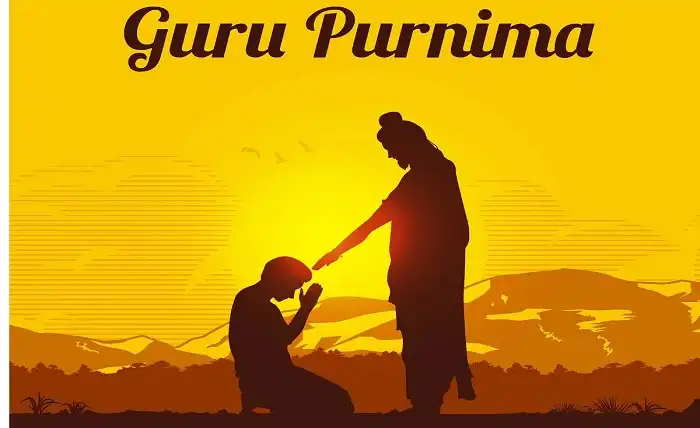Guru Purnima: A Day to Celebrate the Teachers of Life

Guru Purnima is a festival that honors the teachers, mentors, and guides who have illuminated our lives with their wisdom and compassion. It is celebrated on the full moon day of the month of Ashadha (June-July) in the Hindu calendar, which falls on July 3rd in 2023. Guru Purnima is also known as Vyasa Purnima, as it marks the birthday of Veda Vyasa, the sage who compiled the Vedas and authored the Mahabharata. Guru Purnima is observed by Hindus, Buddhists, Jains, and Sikhs across India, Nepal, and Bhutan.
The Meaning and Significance of Guru Purnima
The word guru is derived from the Sanskrit root words gu and ru. Gu means “darkness” or “ignorance”, and ru means “dispeller”. Therefore, a guru is the one who dispels the darkness or ignorance from our minds and hearts. A guru can be anyone who has taught us something valuable, inspired us to grow, or helped us overcome challenges. A guru can be a spiritual master, a teacher, a parent, a friend, or even a stranger.
Guru Purnima is a day to express our gratitude and reverence to our gurus for their selfless service and guidance. It is also a day to reflect on our own learning and progress, and to renew our commitment to follow the path shown by our gurus. Guru Purnima is a day to celebrate the sacred bond between the teacher and the disciple, which is based on trust, respect, devotion, and love.
Read more about G20 Summit 2023: What to Expect from India’s Presidency
The History and Traditions of Guru Purnima
Guru Purnima has its origins in the ancient Indian tradition of guru-shishya parampara, or the lineage of masters and disciples. According to legend, this tradition began when Shiva, the first yogi or adiyogi, imparted the knowledge of yoga to his seven disciples or saptarishis on this day. These saptarishis then spread this knowledge throughout the world.
Another legend attributes the origin of Guru Purnima to Veda Vyasa, who is considered as one of the greatest gurus in Hinduism. He was born on this day and he compiled the four Vedas, which are the oldest scriptures of Hinduism. He also wrote the Mahabharata, which contains the Bhagavad Gita, one of the most revered texts of Hindu philosophy. He also divided the Vedas into four sections and taught them to his four disciples.
Guru Purnima is also celebrated by Buddhists as Dhamma Chakra Pravartan Day or Dhamma Day. It commemorates the day when Buddha gave his first sermon to his five disciples at Sarnath, after attaining enlightenment. He taught them the four noble truths and the eightfold path, which are the core teachings of Buddhism.
On Guru Purnima, people pay homage to their gurus by offering them flowers, fruits, sweets, clothes, or money. They also perform puja or worship rituals for their gurus and seek their blessings. Some people also fast or observe silence on this day as a mark of respect. Some people also recite or listen to scriptures or stories related to their gurus. Some people also meditate or practice yoga on this day to enhance their spiritual connection with their gurus.
The Benefits and Lessons of Guru Purnima
Guru Purnima is not only a festival but also an opportunity to learn and grow from our gurus. By celebrating Guru Purnima, we can benefit in many ways:
- We can express our gratitude and appreciation for our gurus who have enriched our lives with their knowledge and love.
- We can receive their guidance and blessings for our future endeavors and challenges.
- We can review our own learning and achievements and identify our strengths and weaknesses.
- We can rekindle our enthusiasm and motivation for learning and improving ourselves.
- We can cultivate humility and respect for our gurus and for all those who have taught us something.
- We can foster a sense of belonging and community with our fellow seekers and learners.
- We can honor the tradition and legacy of our gurus and carry forward their teachings to others.
Guru Purnima teaches us some valuable lessons that can help us in our personal and professional lives:
- We should always be open to learning from anyone who has something to offer us.
- We should always be grateful for what we have learned and share it with others who need it.
- We should always be respectful and loyal to our gurus and follow their instructions sincerely.
- We should always be humble and acknowledge our limitations and mistakes.
- We should always be curious and eager to explore new horizons and possibilities.
- We should always be diligent and disciplined in our studies and practices.
- We should always be compassionate and generous towards others who are less fortunate or less knowledgeable than us.
Conclusion
Guru Purnima is a festival that celebrates the teachers of life who have enlightened us with their wisdom and love. It is a day to honor our gurus and express our gratitude and reverence to them. It is also a day to reflect on our own learning and progress and to renew our commitment to follow the path shown by our gurus. Guru Purnima is a day to celebrate the sacred bond between the teacher and the disciple, which is based on trust, respect, devotion, and love. Guru Purnima is a day to celebrate the joy of learning and growing from our gurus.




